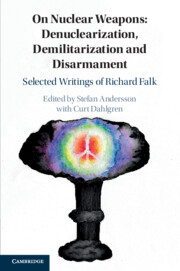 On Nuclear Weapons: Denuclearization, Demilitarization and Disarmament
On Nuclear Weapons: Denuclearization, Demilitarization and Disarmament from Part II - Impacts of Democracy, Neutrality, and National Interest
Published online by Cambridge University Press: 04 July 2019
Ireland occupies a far greater place in the modern political imagination than its size or geopolitical power would seem to warrant. The vividness and heroic character of the Irish national struggle, and its tragic disruption, which continues to yield blood and anguish to this day, are largely responsible for this. I have come to know Ireland concretely in recent years through the happy circumstances of contact with some of its leading citizens. I think particularly of Seán MacBride, who has widened Irish nationalism to embrace the world. He is a strong defender of Ireland’s policy of neutrality and has recently criticized an EEC Assembly resolution urging the Community to speak with one voice in North Atlantic Treaty Organization (NATO) decision councils. He argues that any such step would be in violation of Article 28 of the Irish Constitution, which confers upon the Dial war-declaring powers and the authority to enter into international alliances. MacBride is also very concerned with questioning nuclear weapons and has been a leading force urging international lawyers around the world to mount a campaign for their effective prohibition as legitimate weapons of war. This campaign is very much part of the evolving peace movement in Europe, North America, and Japan, and I think it is the first occasion, at least in my lifetime, that an international law position has been explicitly central to an effort to change general public policy on international questions.
To save this book to your Kindle, first ensure no-reply@cambridge.org is added to your Approved Personal Document E-mail List under your Personal Document Settings on the Manage Your Content and Devices page of your Amazon account. Then enter the ‘name’ part of your Kindle email address below. Find out more about saving to your Kindle.
Note you can select to save to either the @free.kindle.com or @kindle.com variations. ‘@free.kindle.com’ emails are free but can only be saved to your device when it is connected to wi-fi. ‘@kindle.com’ emails can be delivered even when you are not connected to wi-fi, but note that service fees apply.
Find out more about the Kindle Personal Document Service.
To save content items to your account, please confirm that you agree to abide by our usage policies. If this is the first time you use this feature, you will be asked to authorise Cambridge Core to connect with your account. Find out more about saving content to Dropbox.
To save content items to your account, please confirm that you agree to abide by our usage policies. If this is the first time you use this feature, you will be asked to authorise Cambridge Core to connect with your account. Find out more about saving content to Google Drive.